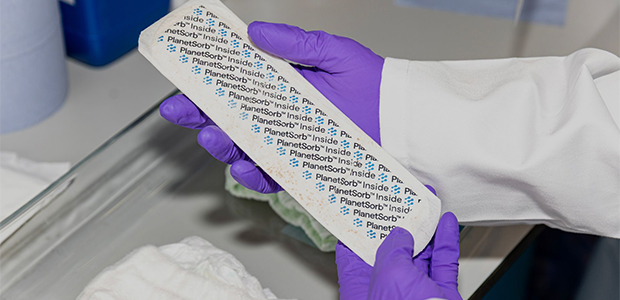
Planet Smart raises $1M to tackle plastic waste hidden inside nappies and pads
Planet Smart, a London-based biomaterials startup, has raised $1 million in pre-seed funding to launch its first product. The company is developing PlanetSorb, a naturally biodegradable superabsorbent polymer (SAP) designed to replace the fossil-based plastics used inside nappies and sanitary products.
The round, led by General Inception and Vertical Venture Partners, with additional backing from Innovate UK and the Undaunted Accelerator, marks the company’s official launch after two years of intense scientific development. The funds will be used to scale R&D and the technical team at its White City laboratory, expand its technical team and begin commercial trials with global hygiene manufacturers.
PlanetSorb is the first SAP that biodegrades within six months without leaving microplastics behind. It also outperforms traditional materials, absorbing more than 1L of liquid per gram, which is up to twice as much liquid while remaining cost-competitive. Because less material is needed to achieve the same result, manufacturers can create thinner, more comfortable products that perform better for consumers – all while remaining cost-competitive with fossil-based alternatives.
“We’ve shown that sustainability doesn’t have to mean sacrifice,” said Dr Gerald Marin, Co-Founder and CEO, Planet Smart. “Our material is greener, faster, and built to scale, and crucially, it simply disappears when its job is done.”
Marin, a materials scientist from the Philippines, met his American co-founder Maurice Rüttimann when they were lockdown flatmates in Brussels during the pandemic. The idea for Planet Smart began after Marin volunteered for a river clean-up in his home country and saw first-hand the scale of waste caused by disposable nappies. “Everyone was talking about plastic bottles and plastic bags,” he recalls, “but hygiene products are one of the biggest sources of microplastic pollution and people don’t even realise it.”
The pair began by running an NGO focused on plastic waste before turning to science to solve the root of the problem. Now based in London’s White City innovation hub, Planet Smart has built a team of polymer chemists and industry veterans from BASF and P&G Ventures.
Marin, a new father, says the mission has become deeply personal. “Every parent knows the guilt of throwing away nappies,” he says. “The first thing we do to babies the moment they’re born is wrap them in plastic. I want to change that by creating smarter biomaterials that my daughter won’t have to clean up in thirty years’ time.”
The global hygiene sector – responsible for an estimated half a million disposable nappies and pads discarded every minute – is under growing regulatory pressure to find alternatives. The EU ban on intentionally added microplastics, introduced last year, and upcoming deforestation laws increasing the cost of wood pulp are driving major manufacturers to seek biodegradable solutions at scale. Planet Smart’s technology, made from poly-amino acids that degrade naturally in soil or landfill, offers a timely and commercially viable answer.
The startup has already signed three letters of intent from leading hygiene manufacturers and two purchase orders with European brands. Third-party testing of PlanetSorb at lab-scale has confirmed that the material is non-toxic, dermatologist-approved and achieves industry-leading absorbency and retention rates.
“This is a breakthrough for both performance and the planet,” said Maurice Rüttimann, Co-Founder and COO. “If we can replace the hidden plastics in everyday products without increasing cost, there’s no excuse not to change.”
Beyond hygiene, the company’s biodegradable absorbents have potential uses in agriculture, wound care, food packaging, and even mining waste management – any industry that relies on materials designed to soak, trap, or retain liquid. “Our polymer could change how entire sectors think about absorption,” Marin added. “From nappies to soil health, the potential impact is enormous.”
“Planet Smart exemplifies the kind of high-impact, science-driven company that can move the needle on climate and waste,” said Sara Jones, Vice President at General Inception. “They’re tackling a global pollution issue with genuine commercial pragmatism.”
With this round of funding, the team will have the ability to scale up and pilot trials from its current lab. With future funding rounds, the team Planet Smart aims to reach one kilotonne of production capacity, which is equivalent to around 45 million nappies’ worth of PlanetSorb, by the end of 2028. The company plans to fundraise further in 2026 to expand manufacturing and establish licensing partnerships with global brands.
“Our goal isn’t to guilt people for using nappies or pads,” Marin said. “It’s to design materials that break down safely without creating microplastics that harm human or planetary health.”
For more startup news, check out the other articles on the website, and subscribe to the magazine for free. Listen to The Cereal Entrepreneur podcast for more interviews with entrepreneurs and big-hitters in the startup ecosystem.

